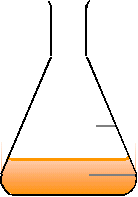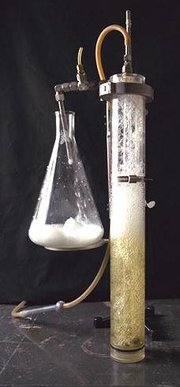Erlenmeyer flask
|
|
An Erlenmeyer flask (also called conical flask) is a type of laboratory glassware which consists of an inverted conical base with a cylindrical neck. The main advantages in an Erlenmeyer flask are that it is less likely to tip over than a beaker and the smaller neck which slows evaporative loss. It can also be swirled without fear of the contents spilling. It is named after the German chemist Richard Erlenmeyer.
The conical flask's counterpart is the beaker. However the main difference is that conical flasks may be stoppered using rubber bungs, so as the contents of the flask may be mixed or transported safely. The flask is not usually used when heating substances vigorously, this task usually being left to either the round-bottomed flask or flat-bottomed flask.
Conical Flasks are usually graduated for general reference but these meaurements are merely approximates. For a more accurate meaurement a pipette or burette should be consulted.
Sometimes to anchor an Erlenmeyer flask, a 'C' shaped lead or iron weight will be placed over the outside, to keep the flask firmly planted.
ca:Matrās Erlenmeyer de:Erlenmeyerkolben nl:Erlenmeyer sv:Erlenmeyerkolv


